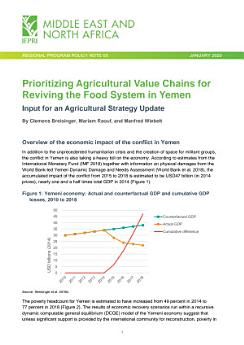Prioritizing agricultural value chains for reviving the food system in Yemen: Input for an agricultural strategy update
Breisinger, Clemens · Raouf, Mariam · Wiebelt, Manfred
Jan 2020 · Intl Food Policy Res Inst
Ebook
7
Pages
family_home
Eligible
info
reportRatings and reviews aren’t verified Learn More
About this ebook
In addition to the unprecedented humanitarian crisis and the creation of space for militant groups, the conflict in Yemen is also taking a heavy toll on the economy. According to estimates from the International Monetary Fund (IMF 2018) together with information on physical damages from the World Bank-led Yemen Dynamic Damage and Needs Assessment (World Bank et al. 2018), the accumulated impact of the conflict from 2015 to 2018 is estimated to be USD47 billion (in 2014 prices), nearly one and a half times total GDP in 2014. The poverty headcount for Yemen is estimated to have increased from 49 percent in 2014 to 77 percent in 2018. The results of economic recovery scenarios run within a recursive dynamic computable general equilibrium (DCGE) model of the Yemeni economy suggest that unless significant support is provided by the international community for reconstruction, poverty in coming years, even if the conflict ends, will remain high or increase even further. Poverty outcomes of alternative post-conflict transition options range between a national poverty rate of 84 percent in the worst-case scenario of economic stagnation and 50 percent in the best-case scenario that involves the recovery of physical capital, total factor productivity (TFP) growth increases in all sectors, and significant inflows of foreign aid. Under a recovery scenario with lower foreign aid, the poverty headcount is projected to fall, but only modestly. Only under a recovery scenario with high aid inflows are poverty levels projected to be below pre-conflict levels by 2025.
Rate this ebook
Tell us what you think.
Reading information
Smartphones and tablets
Install the Google Play Books app for Android and iPad/iPhone. It syncs automatically with your account and allows you to read online or offline wherever you are.
Laptops and computers
You can listen to audiobooks purchased on Google Play using your computer's web browser.
eReaders and other devices
To read on e-ink devices like Kobo eReaders, you'll need to download a file and transfer it to your device. Follow the detailed Help Center instructions to transfer the files to supported eReaders.




